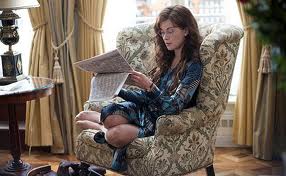Adapted from the Mordecai Richler novel of the same name, Barney’s Version (2010) is the story of Barney (Paul Giamatti) a Jewish Canadian TV producer living in Montreal. It follows him from early adulthood. We first meet Barney in Rome, engaged to the pregnant Clara (Lefevre). Upon returning to Montreal alone, he meets the second Mrs Panofsky (Minnie Driver) and begins another hilarious doomed courtship.
At the wedding party, Barney meets Miriam (Rosamund Pike). For the first time, he is really in love, only to be wrenched away on his honeymoon. Determined to be with Miriam, he sends her a standing order of roses every week, and vows to get a divorce from his second wife.
The rest of the film follows the marriage between Barney and Miriam, Barney’s father Izzy (Dustin Hoffman), their children and friends, and Barney’s decline into old age and infirmary.
Barney’s Version takes a sharp, rye look at the human condition. In a bar, a retired cop who has written a book convinced that Barney has murdered his best friend tells him that he’s “screwed over everyone you ever knew or cared about”. Barney isn’t a bad person, but he is undoubtedly flawed. Despite this, he is surrounded by people who love him, even though he has chips on his shoulders from past failures.
At the core, it’s a film about love. What we’ll do to pursue it, what to do with it once we’ve got it, and how easy it is to spoil. Love is the central theme around which the characters orbit, be it marital, or paternal, or between friends. It’s the changes in the relationships which propel the film forwards, which draw the audience in and keep their interest sustained.
Barney’s Version begins in the present, indicating that Barney is divorced and living alone, we know that a death has probably taken place, that he drinks and calls up his ex-wife’s new husband at 3am. It skips back in time, and the majority of the film is told in a flashback. With the framing, the audience has some expectation to work towards, and it keeps us striving towards the finish.
Director Richard J Lewis is firmly on the side of Barney, despite his flaws and the many mistakes he makes. In the cinema this makes a lot of sense, he is the protagonist after all. But with one minute of thinking, it seems unfair to the others to dismiss their concerns and hard-feelings. Barney misses Miriam’s first radio interview in two decades because he was drunk and watching hockey, but the tone of the film says ‘Barney is such a schmuck, he’s out drinking again and neglecting his wife, that rascal’ when we should really be on the side of poor Miriam. He’s rude to her friends at dinner parties, but when he slopes off to smoke a cigar, we follow him and watch him sulk, instead of empathising with Miriam for having such an unbending buzz kill as a husband.
This is of course Barney’s version of his life, but an authoritative autobiographical voice from the book is missing, and Lewis doesn’t give the audience a way to really get inside Barney’s head. Some of the altercations seem very lop-sided, we take the side of Barney when we’re not really sure that we should, and there is little to convince us otherwise.
What makes the movie really sparkle is it’s acting performances. Giamatti gives Barney an undoubtedly likeable affability. For all his flaws, he’s funny, has moments of kindness, and really does appear to love Miriam.
Pike gives a solid performance of Miriam, but her character is developed much further than that of a child-bearing Madonna, and it’s when she tries to strike out of this role that the marriage hits the rocks. She lit up the screen, it seems a shame that she wasn’t given a more meaty, important role; Barney saw her as a wife and mother, so that’s all we saw her as too.
The second Mrs Panofsky was a parody of stereotypical ‘Jewish American Princess’, almost inhuman in it’s shrieking glory. Driver’s idioms were spot-on, and it was great to see a supporting actor put so much enthusiasm into a role.
I really enjoyed Hoffman is Barney’s father, providing a lot of humour and some of the more sensitive moments, allowing Barney to reveal something of an emotional side. Izzy’s death was very funny as well as touching, and the on-screen chemistry between Hoffman and Giamatti was great.
Barney’s Version is an imperfect film about an imperfect man. Despite the flaws of both, I was completely drawn in, and became very invested in Barney even though I didn’t always like him or his actions.
Though largely a comedy, it whacked an emotional punch too, and kept me thinking well long after I’d left the cinema.
Barney’s Version played at the UK Jewish Film Festival. For more information on the remainder of the festival, visit their website: www.ukjewishfilm.org




